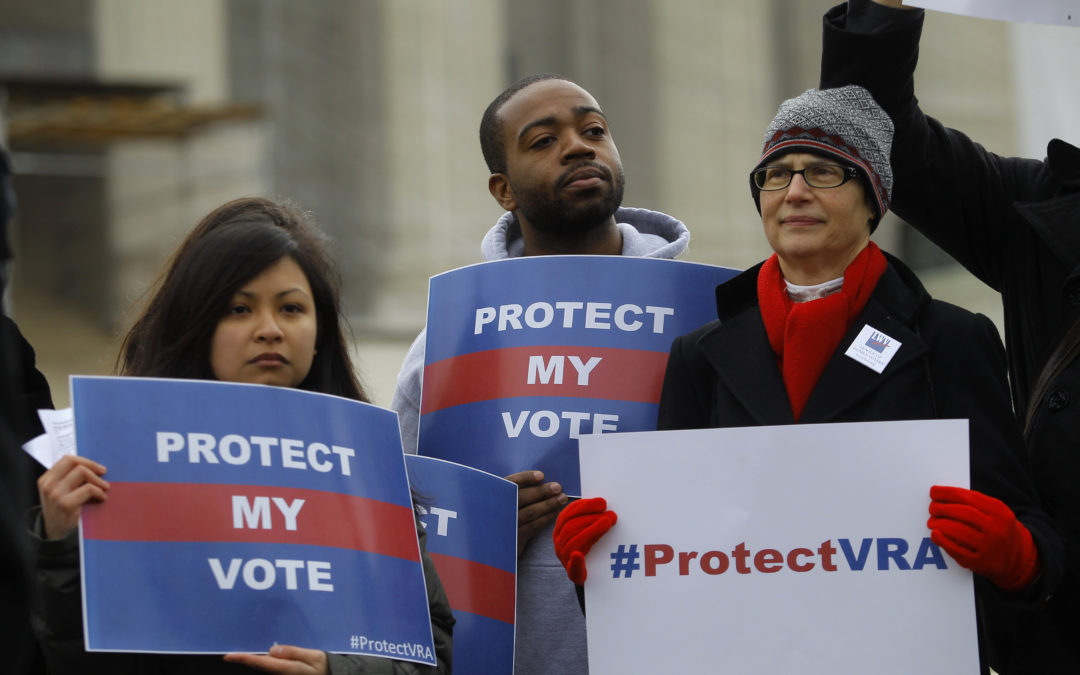“The vote is precious. It is almost sacred. It is the most powerful nonviolent tool we have in democracy.” – John Lewis
Eight years ago, in the disastrous Shelby County v. Holder decision, the U.S. Supreme Court struck down a significant provision of the Voting Rights Act (VRA) and opened the floodgates for the voter suppression legislation and procedures prevalent in states today. The Supreme Court essentially nullified the provision of the VRA that required jurisdictions with a history of voting discrimination to get federal approval before new voting laws could be implemented.
The very day of the decision, Texas chose to implement its voter ID law, which had been previously found to be discriminatory. Since then, many states have followed Texas’ example by enacting laws that have made it harder for voters, particularly voters of color, to access the ballot box.
Over the past eight years, state legislatures, particularly the states that previously had to submit voting changes for preclearance review, have focused on passing laws making it harder to vote or enacting processes that:
- Require voter ID where voters had limited options of the type of IDs they could use to vote;
- Make it harder to get on or stay on voter registration rolls;
- Consolidate or close polling places with little or no notice to voters; or
- Make it easier to remove voters from voter rolls.
In 2016, the Fourth Circuit determined that North Carolina’s omnibus voter suppression law passed a month after the Shelby County decision was enacted to “target African Americans with surgical precision.” Despite courts finding that certain laws make it harder for minority voters to cast a ballot, state legislatures are doubling down and insisting on passing laws that make it harder to vote.
Disturbingly, in response to unprecedented voter turnout in 2020, states such as Georgia, Florida, and Texas, all are states with a history of voting discrimination, have passed or are considering laws that will make it harder to vote. Georgia’s SB 202 not only makes it harder to vote, but it also criminalizes voter assistance. Florida’s SB 90 makes it more difficult to vote by mail and receive voter assistance. And Texas is currently considering SB 7, which takes away the power of local elections to make voting more accessible, limits Sunday early voting by targeting get out the vote initiatives such as “Souls to the Polls” used by Black voters, and it makes it harder for voters with disabilities or those who need language assistance to get that assistance by imposing harsh penalties on those who would provide it.
Overall, the legacy of the Shelby County decision is a grim one. Our nation is at an inflection point where access to the most fundamental right in our democracy depends on where you live.
A few weeks ago, the U.S. Department of Justice announced that it will be doing more to protect voting rights – including doubling the number of staff members who will be scrutinizing and working to curb these suppressive new laws. But, that is still not enough. We still need Congress to do its job and pass legislation that ensures this trend of suppressive voting legislation stops.
We cannot afford to sit on the sidelines. We must hold our elected officials accountable and insist that they do the work necessary to protect our democracy. The January 6 insurrection was a wakeup call. The spate of suppressive legislation being enacted and considered is a wake-up call, too.
The late great John Lewis called on all of us to get into ‘good trouble’ to ensure that we live up to the ideals of our nation; our democracy. We can begin by raising our collective voices by insisting that Congress pass the For the People Act and the John Lewis Voting Rights Advancement Act. We cannot afford to be silent.
Marcia Johnson-Blanco is the co-director of the Voting Rights Project at the Lawyers’ Committee for Civil Rights Under Law.


